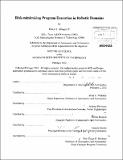Risk-minimizing program execution in robotic domains
Author(s)
Effinger, Robert T
DownloadFull printable version (17.70Mb)
Other Contributors
Massachusetts Institute of Technology. Dept. of Aeronautics and Astronautics.
Advisor
Brian C. Williams.
Terms of use
Metadata
Show full item recordAbstract
In this thesis, we argue that autonomous robots operating in hostile and uncertain environments can improve robustness by computing and reasoning explicitly about risk. Autonomous robots with a keen sensitivity to risk can be trusted with critical missions, such as exploring deep space and assisting on the battlefield. We introduce a novel, risk-minimizing approach to program execution that utilizes program flexibility and estimation of risk in order to make runtime decisions that minimize the probability of program failure. Our risk-minimizing executive, called Murphy, utilizes two forms of program flexibility, 1) flexible scheduling of activity timing, and 2) redundant choice between subprocedures, in order to minimize two forms of program risk, 1) exceptions arising from activity failures, and 2) exceptions arising from timing constraint violations in a program. Murphy takes two inputs, a program written in a nondeterministic variant of the Reactive Model-based Programming Language (RMPL) and a set of stochastic activity failure models, one for each activity in a program, and computes two outputs, a risk-minimizing decision policy and value function. The decision policy informs Murphy which decisions to make at runtime in order to minimize risk, while the value function quantifies risk. In order to execute with low latency, Murphy computes the decision policy and value function offline, as a compilation step prior to program execution. In this thesis, we develop three approaches to RMPL program execution. First, we develop an approach that is guaranteed to minimize risk. For this approach, we reason probabilistically about risk by framing program execution as a Markov Decision Process (MDP). Next, we develop an approach that avoids risk altogether. For this approach, we frame program execution as a novel form of constraint-based temporal reasoning. Finally, we develop an execution approach that trades optimality in risk avoidance for tractability. For this approach, we leverage prior work in hierarchical decomposition of MDPs in order to mitigate complexity. We benchmark the tractability of each approach on a set of representative RMPL programs, and we demonstrate the applicability of the approach on a humanoid robot simulator.
Description
Thesis (Sc. D.)--Massachusetts Institute of Technology, Dept. of Aeronautics and Astronautics, 2012. Cataloged from PDF version of thesis. Includes bibliographical references (p. 153-161).
Date issued
2012Department
Massachusetts Institute of Technology. Department of Aeronautics and AstronauticsPublisher
Massachusetts Institute of Technology
Keywords
Aeronautics and Astronautics.